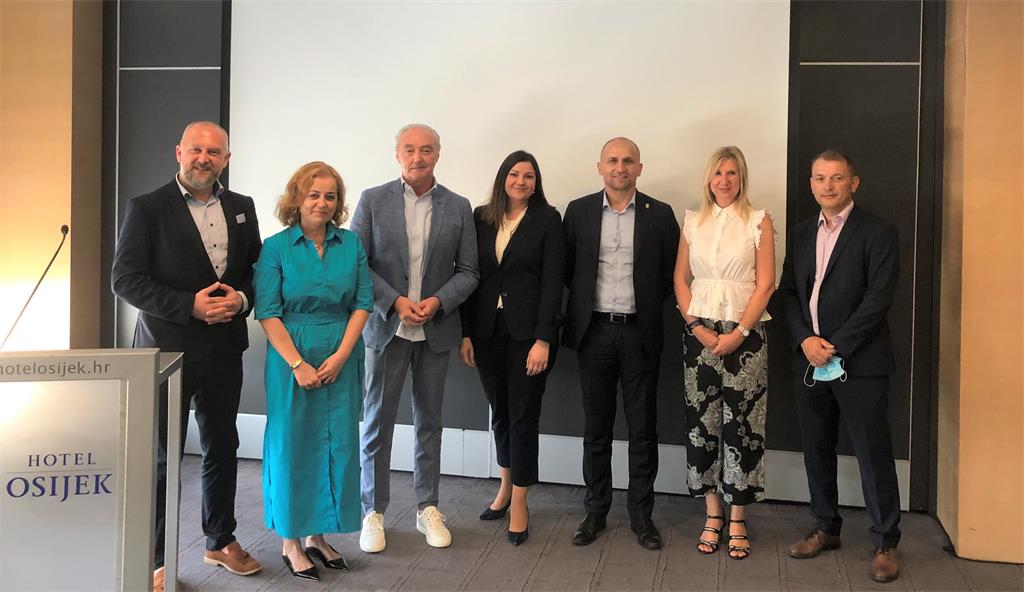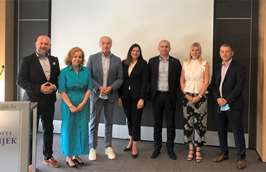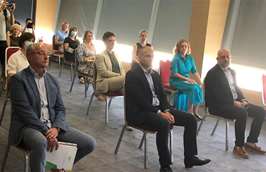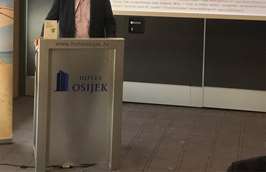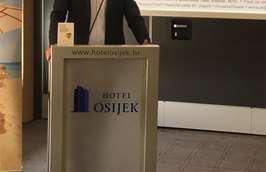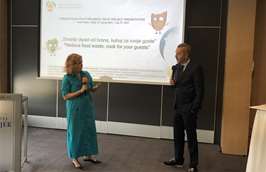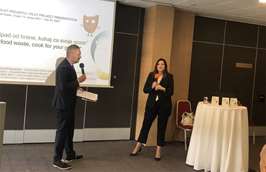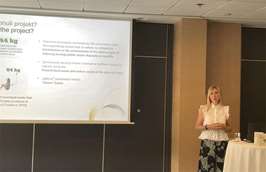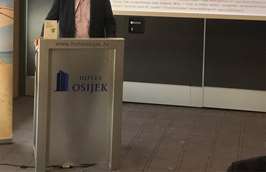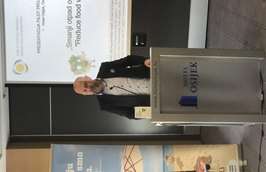09.07.2021.
Another presentation of the pilot project “Reduce food waste, cook for your guests” implemented by the Fund was held in the Osijek Hotel in Osijek. The project was launched with the aim of introducing work methods in the hotel kitchens that will contribute to reducing the quantity of food waste.The presentation was attend by the director of the Environmental Protection and Energy Efficiency Fund Siniša Kukić, the mayor of Osijek-Baranja County Ivan Anušić, the president of the Osijek City Council Vladimir Ham, director of the Directorate for Sustainable Development and Competitiveness of Tourist Destinations at the Ministry of Tourism and Sport Slavko Štefičar, general manager of Hotel Osijek Sandra Đurđević, and other representatives of the Osijek Hotel Group, the Fund, and local and regional self-government.
In his welcome speech, Director of the Fund Siniša Kukić expressed his pleasure with the fact that the project started in the Osijek Hotel, a continental hotel with a different dynamic of guests and overall operation compared to hotels on the coast. “It is my great pleasure that the Fund, among the many waste management activities we are doing, has also started dealing with this matter. It really is the irony of the modern world; on the one hand, there are people with nothing to eat, and on the other our modern society is producing enormous surplus of food that ends up as food waste. That is why it is so important to plan the meals, both in our own households, and in the hotels,” said Kukić.
Ivan Anušić, the mayor of Osijek-Baranja County, agreed with him, saying he believed we had to learn to manage food as a resource in a cleverer way, become more rational and optimally use the potential we had at disposal. “We have to find the right model of managing food, as the fundamental necessities of every human being. Slavonija is, in general, the area that is simply meant for producing food, it used to be the main source of living in the past, and it is definitely the future of the region. This is a good place to be communicating about this topic and send the message to the public, because it is becoming a burning issue at the moment.”
The president of the City Council of Osijek Vladimir Ham followed up on that saying that he believed that the problem of throwing away food and generating biowaste was troubling developed countries, creating not only injustice but environmental issues as well. “In the last couple of years, Osijek has become a leader in waste separation and taking care of the waste, and I’m proud to say that we have also come a long way in terms of separating biowaste in households. I believe that projects like this one will contribute to the largest producers – the tourism sector – reduce these quantities to a minimum,” he concluded.
“The plan is to have Croatia’s tourism based on sustainability, and activities like this one are contributing to these goals,” said the Slavko Štefičar, the director of the Directorate for Sustainable Development and Competitiveness of Tourist Destinations at the Ministry of Tourism and Sport. He added that the guests nowadays were also more observant of the details whether a destination was sustainable and their accommodation green.
“Hotel guests are important stakeholders in this pilot project because without them and changing their eating habits when they take or order food, the goals we want to achieve would not be possible. In communication with the guests, we want to subtly inspire them and make them aware of how to behave when they fill their plates. We don’t want anyone to go hungry; we want them to become aware and not take more than they will eat, because these leftovers will end up in the rubbish. Hotels around the world that implemented the food waste prevention strategies reduced its quantities by some 30%, they reduced negative environmental impacts, and achieved significant financial savings. One of the important project goals is reducing the share of landfilled biodegradable waste,” said Maja Feketić, head of the EU Funds Sector at the Fund.
“What we can certainly say that today more and more guests are looking for green hotels. New trends in tourism are presenting the opportunity to improve the quality of accommodation in Croatia that will become environmentally friendly, attractive for more demanding tourists, and contribute to extending the tourist season and tourist valorisation of the entire Croatian territory on the path to sustainability. This is a global movement that goes beyond our national borders, because the trend of environmentally conscious guests looking for green hotels who are willing to pay extra to stay in an environmentally friendly hotel is growing,” said Vesna Cetin Krnjević, project coordinator and head of the Department for the implementation of EU projects at the Fund.
The general manager of the Osijek Hotel Sandra Đurđević expressed her satisfaction with participation in the project. “To be part of this pilot-project by the Environmental Protection and Energy Efficiency Fund is a great pleasure for all of us, and a logical follow-up because we have already started implementing certain measures at the hotel to reduce and sort food waste. I think of our participation in the project as a sort of upgrade, the chance to make our hotel even greener, and to really fully embrace the green business model,” said Đurđević.
The pilot-project “Reduce food waste, cook for your guests” was launched in two Croatian hotels – in Osijek and in Pula, with the aim of introducing work methods in the hotel kitchens that will contribute to reducing food waste. Before today’s presentation of the project, the workshops for the hotel staff were held, where they could see the examples of the hotels that were already implementing meal planning, proper storage of ingredients, and sensible estimation of meal size. In cooperation with the hotel staff, measurements are being carried out, and the results will be reported in the autumn in Osijek and Pula.
The project is implemented by the Environmental Protection and Energy Efficiency Fund in cooperation with the Ministry of Economy and Sustainable Development, the Ministry of Tourism and Sprot, and the Faculty of Geotechnical Engineering of the University in Zagreb.
